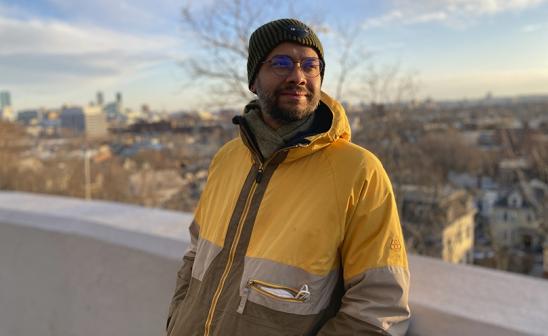A New Course on the Anthropology of Revolutions Explores Knowledge Production of Uprisings

Using academic texts, poetry, film and more, students will explore the unpredictability of revolution.
By Sarah Steimer
Despite what we may know about revolution after studying historical examples, perhaps the biggest takeaway is the uncertainty and sense of possibility inherent to these events. It’s a lesson that Teaching Fellow Abhishek Bhattacharyya hopes students will come away with from his new course on the topic.
“Previous texts considered revolution to end before the 2000s,” says Bhattacharyya, who holds a joint PhD in Anthropology and South Asian Languages and Civilizations. “One thing I want to encourage people to think of is: What are the actual live possibilities in the world for these processes to happen?”
Bhattacharyya’s own research has focused on knowledge production. More specifically, he’s explored revolutionary political movements such as the ongoing Naxalite movement, from the late 1960s to early 1990s. In his work on how knowledge of these conflicts is produced, he noticed a conflict in perspective between those on the ground and those writing about it in academia. In a reading course that focused on theorizing about revolutions that he designed with John Kelly, the Christian W. Mackauer Professor of Anthropology and of Social Sciences, Bhattacharyya noticed how questions around revolution have changed from decade to decade. And now, in recent years, the topic is being explored anew.
“There's suddenly a flurry of new books on revolution,” he says. “And a lot of them are very exciting.”
Bhattacharyya’s course, “Anthropology of Revolutions,” explores how content on movements has changed from one period to the next. This includes academic texts, but also content taking the form of poetry, graphic novels, and film.
The course will begin with a book on Ethiopian revolutionary politics by Columbia University professor Elleni Centime Zeleke, which focuses on student politics — making it a relatable entry for students in the class. Bhattacharyya will assign readings about the concept of revolution itself: foundational questions that will focus on the French Revolution and the Haitian Revolution, as well as ways of conceiving revolution beyond such events, for instance through restructurings of intimate lives, or explorations of desire
Students will also read work by UChicago anthropologist Michel-Rolph Trouillot, who writes about how — in the context of revolution — it was difficult for slave owners to imagine that those they had enslaved could revolt. “With that,” Bhattacharyya says, “I'm trying to get students to think about how something that seemed inconceivable at a particular point in time ended up happening.”
Then on to more contemporary texts: ranging from readings on Soviet Russia and U.S. politics, particularly around the Black Panthers and other Black political organizing, to the Arab Spring. He’ll also cover Maoist organizing in the South Asian context.
Students will have a lot of flexibility to explore content around revolutions they’re particularly interested in, Bhattacharyya notes. “There will be a lot of scope for them to build on some specific thing while we are discussing a concept overall in the class.”
Bhattacharyya recommends the course to students interested in anthropology or what anthropological knowledge production can mean, along with those interested in understanding social or political movements, activism, or history, plus those looking to explore questions of race, gender, or empires.
“Oftentimes what happens in anthropology is that the approach is to go to a particular place, and capture a snapshot in time,” he says. “I do fieldwork for a year, I see what's happening there, and then I write about it. But this kind of movement-oriented anthropology is looking at a long duration of work with a historical consciousness of change: It's not just when you happen to be somewhere, but where in the trajectory of things you happen to be. I'm hoping to teach the methods of historical writing using anthropological methods.”
He also hopes students come away from the course with a more historicized sense of social movements. “Currently, questions of revolution mean something in the U.S. political sphere, but they have meant various different things in various places in time,” Bhattacharyya says. “The course will encourage a kind of defamiliarization of some concepts that they may be coming across anyway, while also providing longer histories of those concepts.”
 THE UNIVERSITY OF CHICAGO
THE UNIVERSITY OF CHICAGO

